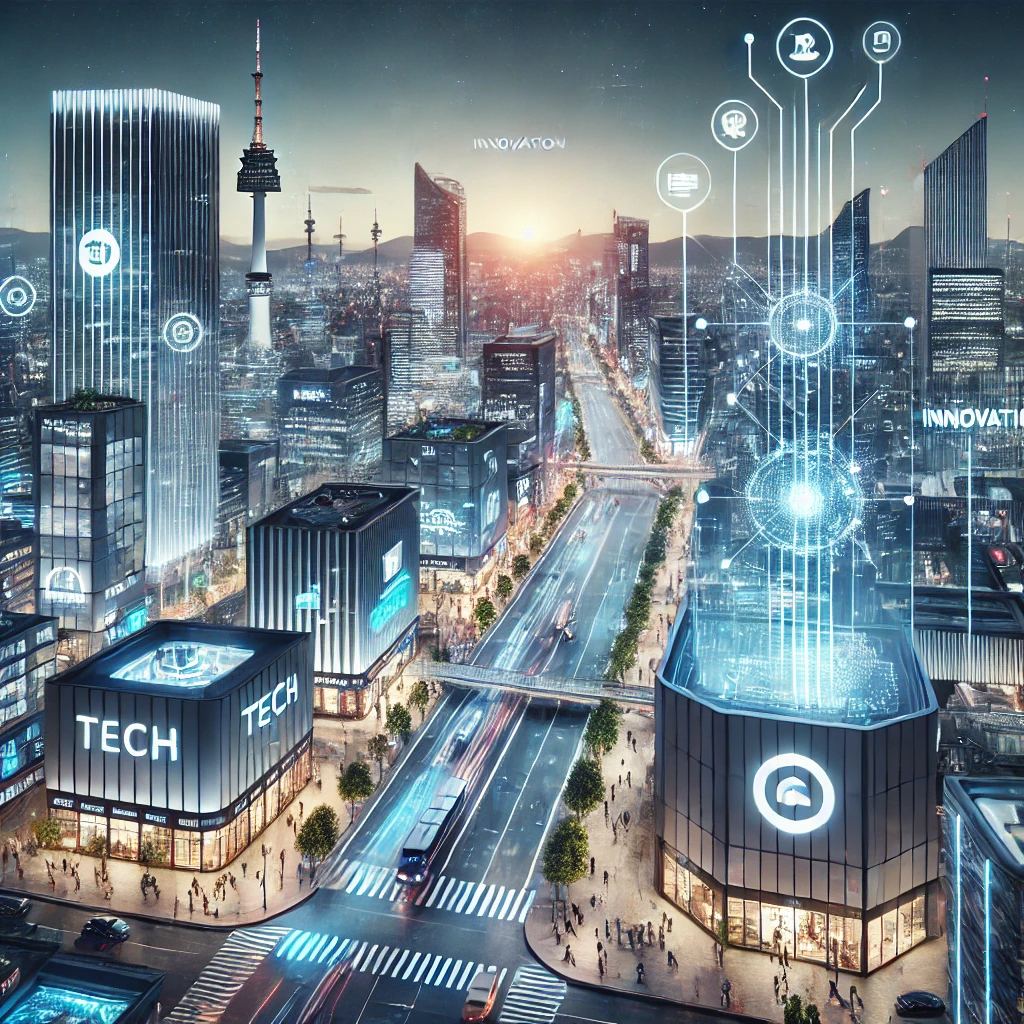Table of Contents
Introduction to Seoul’s Tech Landscape
Over the past few decades, Seoul has emerged as a formidable global tech hub, significantly influencing the technology landscape both in Asia and worldwide. This transformation can be attributed to a combination of government support, a highly educated workforce, and a thriving startup ecosystem. The South Korean government has consistently prioritized technology as a key driver of economic growth, investing heavily in research and development, infrastructure, and innovation initiatives. As a result, Seoul’s tech sector has flourished, fostering an environment conducive to technological advancement.
One of the most notable aspects of Seoul’s tech boom is the rapid development of its digital economy. The city is home to leading technology companies, including Samsung Electronics and LG, which play a pivotal role in the South Korean economy. These conglomerates not only contribute significantly to job creation but also drive technological innovations that ripple through various sectors. In addition to the larger corporations, Seoul’s vibrant startup culture has gained international recognition, nurturing young entrepreneurs who are pushing boundaries across fields such as artificial intelligence, fintech, and e-commerce.
The interplay between established corporate giants and ambitious startups creates a dynamic ecosystem that spurs collaboration and competition, ultimately benefiting consumers and businesses alike. Furthermore, Seoul’s strategic location and robust infrastructure enhance its appeal as a global tech center, attracting foreign investments and talent. The city’s lifestyle, characterized by a strong digital culture and heavy reliance on technology in everyday life, reflects the significance of these advancements within the broader context of South Korean society.
As we delve deeper into Seoul’s tech landscape, it becomes essential to recognize the collaborative efforts of various stakeholders, from government agencies to educational institutions, all working towards elevating the city’s status on the global stage. The rapid evolution of this tech hub is not merely a local phenomenon; it signifies a broader shift in the way technology is perceived and utilized in the modern economy.

Historical Context of South Korea’s Technological Advancements
South Korea’s technological advancements are deeply rooted in its post-war development, where the nation transformed from a war-torn country into an emerging economic powerhouse. Following the Korean War, which concluded in 1953, South Korea faced significant challenges, including extensive damage to its infrastructure and a lack of resources. However, through a combination of strategic government initiatives and economic reforms, the country laid the groundwork for impressive growth in various industries, particularly technology.
In the 1960s and 1970s, the South Korean government implemented a series of five-year economic plans, emphasizing heavy industries and exports. A pivotal component of these plans was the development of state-owned enterprises that focused on electronics and machinery. Through extensive investments in education and technology, the government actively promoted a culture of innovation. This approach encouraged the establishment of pivotal institutions like the Electronics and Telecommunications Research Institute, which played a crucial role in advancing electronics research and development.
As a result of these initiatives, South Korea witnessed significant growth in the electronics and information technology (IT) sector. The 1980s marked a significant turning point, as companies such as Samsung and LG began to emerge as global leaders in electronics. These pioneers placed a strong emphasis on research and development, leveraging the country’s skilled workforce. The government’s continuous support and policies encouraging innovation further solidified the electronics sector’s rise, ultimately leading to the establishment of South Korea as a prominent player in the global tech landscape.
Overall, the historical context of South Korea’s technological advancements illustrates a compelling narrative of resilience and strategic planning. The synergy between government initiatives, investment in education, and the rise of major corporations has paved the way for Seoul to blossom into a global tech hub that continues to shape the future of technology.
Key Companies Driving the Tech Boom
Seoul’s rise as a global tech hub is significantly attributed to several key companies that have not only transformed the local economy but have also made substantial contributions to the international tech landscape. Among them, Samsung and LG stand out as front-runners in innovation and market expansion, while a vibrant startup culture continues to enrich the industry.
Samsung, a titan in electronics and telecommunications, has established itself as a leader through its relentless pursuit of innovation. The company invests heavily in research and development, which has resulted in groundbreaking technologies and consumer electronics that set global standards. Samsung’s commitment to sustainability and smart technology positions it as a pivotal player in the global market. With initiatives such as the Samsung Innovation Museum, the company not only showcases its historical milestones but also emphasizes its forward-thinking approach, ensuring a continuous stream of advancements that benefit consumers and industry alike.
Similarly, LG has carved its niche by focusing on home appliances, consumer electronics, and mobile communications. The company’s strategic emphasis on creating smart, interconnected devices aligns with the growing demand for IoT (Internet of Things) technologies, thus appealing to tech-savvy consumers. LG’s investments in AI and robotics are soon expected to further revolutionize the tech landscape, reinforcing Seoul’s status as a technological leader.
In addition to these electronics giants, a burgeoning ecosystem of startups in Seoul is driving dynamic innovation. Enhanced by supportive government policies and initiatives, startups like Kakao and Naver are making significant strides in various sectors, including fintech and e-commerce. Their agility and creativity complement the established players, fostering a rich environment of technological advancement. Together, these companies are fundamentally reshaping not only Seoul but also the global technology scene, making the city a focal point for innovation and development.
The Role of Government Policies and Investments
South Korea’s ascendance as a global tech hub can be attributed significantly to the strategic interventions and investments made by the government. Over the past few decades, various policies have fostered an environment conducive to technological innovation and entrepreneurship. One of the most notable initiatives is the South Korean government’s “Creative Economy” strategy, which was launched in 2013. This framework aims to stimulate economic growth by leveraging technology and nurturing startups, ultimately encouraging collaborations across sectors.
Additionally, the government has introduced various incentives that specifically target research and development (R&D) projects. For instance, substantial tax reductions and grants are provided to companies engaged in developing new technologies, which reduces the financial burden on firms and encourages ongoing innovation. Such measures have not only benefited established businesses but also have been crucial in supporting startups, allowing them to thrive in an increasingly competitive landscape.
Public and private partnerships have also become a cornerstone of South Korea’s tech ecosystem. The government actively collaborates with private sector firms and research institutions to promote advancements in key technology areas, such as artificial intelligence, biotechnology, and information technology. Funding initiatives and venture capital programs have been established to bolster startup growth, providing critical resources that are often necessary for young companies to scale effectively.
Moreover, South Korea’s educational system has been aligned with its technological ambitions. The government prioritizes STEM education, ensuring a steady pipeline of skilled workers who are equipped to meet the demands of the tech industry. Through these comprehensive measures, South Korea not only nurtures talent but also cultivates an environment where innovation can flourish.
Ultimately, the South Korean government’s proactive stance on technology policies and investments lays a robust foundation for the transformation of Seoul into a vibrant global tech hub.
Seoul’s Startup Ecosystem: A Hotbed for Innovation
Seoul has increasingly gained recognition as a vibrant startup ecosystem, fostering innovation and entrepreneurship. At the heart of this transformation are numerous incubators, accelerators, and co-working spaces that provide essential support to emerging entrepreneurs. These institutions play a pivotal role in nurturing early-stage ventures, offering them not only critical resources but also mentorship and networking opportunities.
Several well-known accelerators, such as SparkLabs and TIPS, have established themselves as key players within the ecosystem. These programs enable startups to access funding, gain exposure, and develop essential skills for rapid growth. In addition to financial assistance, participants often benefit from counseling by industry veterans who share insights on scaling their businesses and navigating the competitive landscape.
A notable feature of Seoul’s startup landscape is its numerous co-working spaces. Often designed to inspire collaboration, these hubs, such as WeWork and The Executive Centre, provide entrepreneurs and remote workers with a dynamic environment to thrive. By facilitating interactions among diverse professionals, these spaces nurture creativity and encourage the exchange of ideas, which can lead to innovative solutions and partnerships.
The cultural mindset in South Korea also plays a crucial role in promoting innovation. Young entrepreneurs are not only encouraged to venture into uncharted territories but are also celebrated for their efforts. This positive attitude towards risk-taking fosters an atmosphere where failure is viewed as a stepping stone to success rather than a debilitating setback. As a result, the startup community in Seoul thrives on a diverse range of ideas and experimentation, fueling the growth of technology-driven solutions.
In summary, Seoul’s startup ecosystem is bolstered by a robust network of incubators, accelerators, and co-working spaces, complemented by a cultural inclination towards innovation. Together, these elements create a supportive environment that propels the city towards becoming a global technology hub.
Educational Institutions and Research Initiatives
The tech landscape of Seoul has been significantly shaped by its robust educational institutions and dynamic research initiatives. South Korea is home to numerous prestigious universities, including Seoul National University, KAIST, and POSTECH, which have established strong reputations for their STEM (Science, Technology, Engineering, and Mathematics) programs. The emphasis on STEM education fosters a skilled workforce that is essential for sustaining innovation in technology sectors.
Partnerships between academia and industry play a crucial role in this ecosystem. Universities in Seoul actively collaborate with technology companies to develop practical research that meets real-world demands. Such partnerships often result in joint projects, internships, and research funding, creating a pipeline of talent prepared to tackle contemporary technological challenges. For instance, major corporations like Samsung and LG regularly engage with academic institutions to foster innovation and research that aligns with their strategic goals. This synergy enhances both the learning experience for students and the research output that drives the tech industry forward.
Moreover, various research initiatives in Seoul are aimed at pushing the boundaries of technology. Government-backed organizations, such as the Korea Institute of Science and Technology, work in tandem with universities to conduct cutting-edge research in areas like artificial intelligence, robotics, and biotechnology. The focus on interdisciplinary approaches allows researchers to address complex issues that require diverse expertise. As a result, these initiatives contribute to the global tech landscape, positioning Seoul as a leader in technological advancements.
In conclusion, the collaboration between educational institutions and industries, combined with targeted research efforts, forms the backbone of Seoul’s thriving tech ecosystem. This concerted focus on education and research not only nurtures talent but also accelerates innovation, establishing Seoul as a prominent global tech hub.
Challenges Faced by the Tech Industry
Seoul’s ascendance as a global tech hub has not been without its obstacles. One of the most significant challenges is the intense competition that the South Korean tech industry faces from other established and emerging global tech hubs. Cities such as Silicon Valley, Beijing, and Singapore have robust ecosystems that attract top talent and investment. As these hubs continue to innovate and expand, Seoul must navigate the complexities of maintaining its competitive edge in technology development and innovation.
Another pressing issue for the tech sector in Seoul is the presence of regulatory hurdles that can stifle growth. The South Korean government, while supportive of the tech industry, has imposed regulations that can create barriers to entry and hinder the agility that is often necessary for startups. These regulations, which can pertain to data privacy, cybersecurity, and labor rights, require startup founders and tech companies to invest substantial time and resources to ensure compliance, which may detract from their ability to innovate rapidly.
Moreover, talent retention has emerged as a critical concern. As competition heats up, retaining skilled professionals becomes increasingly challenging. Many South Korean tech workers seek opportunities abroad, drawn by lucrative offers from international companies. This exodus can lead to a talent shortage within the local ecosystem, making it difficult for companies to scale effectively or undertake new projects. Additionally, the constant need for continuous innovation complicates matters, as tech companies must consistently evolve their products and services to ensure relevance in a fast-paced digital world. Failure to innovate risks stagnation, further exacerbating competition with global rivals and hindering Seoul’s potential for sustained growth as a technology leader.
The Future of Tech in Seoul
As Seoul continues to solidify its status as a global tech hub, the future of technology in the city is poised for significant advancements that align with various emerging trends. Leading this charge is the burgeoning field of artificial intelligence (AI), which is expected to play a vital role across multiple sectors, including healthcare, transportation, and smart cities. The integration of AI technologies into daily life aims to enhance both the efficiency and convenience of urban living. Furthermore, initiatives such as the Seoul Smart City Project are actively promoting the development of AI-driven solutions designed to address urban challenges, from traffic management to waste disposal.
Another promising trend is the pursuit of sustainability within the tech sector. As global awareness of environmental issues rises, Seoul is taking proactive measures to integrate green technology within its infrastructure. Efforts include developing energy-efficient buildings, enhancing public transportation, and promoting electric vehicles. The city’s Green New Deal aims to establish an eco-friendly urban framework encouraging innovation while prioritizing sustainability. Companies are being incentivized to adopt eco-conscious practices, creating an environment where both technology and ecology can flourish.
Additionally, the emphasis on collaboration between start-ups, established tech firms, and academic institutions is expected to shape Seoul’s tech landscape. The city fosters an environment ripe for innovation through various incubator programs and innovation districts that encourage entrepreneurship. As start-ups explore new frontiers such as blockchain, fintech, and biotechnology, the collaborative ecosystem enhances the potential for groundbreaking developments.
Overall, as Seoul strives to remain competitive on a global scale, a combination of AI advancements, sustainability initiatives, and collaborative innovation is set to define the next chapter in the city’s technological journey. The integration of these elements not only positions Seoul as a frontrunner but also sets a precedent for other metropolises aiming to capitalize on the tech boom.
Conclusion: Lessons from Seoul’s Tech Boom
Seoul’s remarkable transformation into a global technology hub serves as a pertinent case study for regions aspiring for similar growth. This journey has been characterized by a multifaceted approach that encompasses government support, robust infrastructure, and a vibrant entrepreneurial ecosystem. The government’s proactive role has been instrumental, evident through its dedicated investments in technology initiatives and the establishment of favorable policies that encourage innovation and ease of doing business.
Another critical factor in Seoul’s tech success is its advanced infrastructure, which includes a reliable internet connection and state-of-the-art facilities. This connectivity fosters the development of digital platforms, enabling startups and established companies alike to thrive. Moreover, the collaboration between educational institutions and industries has cultivated a knowledgeable workforce, ensuring that the talent pool is well-equipped to meet the demands of an evolving tech landscape.
The city’s emphasis on fostering a community of startups is noteworthy. By providing resources such as incubators, accelerators, and funding opportunities, Seoul has created an environment conducive to innovation. This ecosystem not only nurtures homegrown talent but also attracts foreign investments, further enhancing the city’s position as a tech leader. The successful integration of the public and private sectors in this effort highlights the importance of collaborative engagement in driving tech advancement.
Regions looking to emulate Seoul’s success should consider adopting a similar strategy that prioritizes government involvement, infrastructure development, and community support. Additionally, fostering a culture of innovation and entrepreneurship will be crucial. By understanding and implementing the lessons gleaned from Seoul’s tech boom, other cities can effectively navigate the complex landscape of technology development and position themselves for sustainable growth in the global arena.





